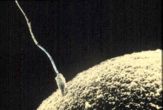
Men are more likely to father dwarves as they grow older due to an age-related genetic mutation in their sperm, a new study finds.
The finding, detailed in this week's online edition of the journal for the Proceedings of the National Academy of Sciences, supports the idea that men who delay fatherhood too long put their children at higher risk of inheriting certain genetic diseases.
The researchers analyzed gene mutations and other types of DNA damage in sperm samples collected from 97 healthy men between the ages of 22 and 80 who were living in California.
The bad news
They found that the likelihood of acquiring a genetic mutation that causes achondroplasia, a type of dwarfism, increases by about 2 percent per year, beginning in a male's mid-20s.
They also found that the DNA strands in sperm are more likely to "fragment," or acquire random breaks, as men get older. Other studies have shown that DNA fragmentation can reduce a sperm's chances of fertilizing an egg.
Despite being genetically damaged, the corrupted sperm appeared as frisky as their genetically healthy counterparts, moving about as quickly as normal. This suggests that conventional tests of sperm quality are not reliable predictors of genetic damage, the researchers say.
Sign up for the Live Science daily newsletter now
Get the world’s most fascinating discoveries delivered straight to your inbox.
Some good news
One silver lining: The risks of producing sperm with too many or too few chromosomes does not appear to increase with age in men. Called "aneuploidy," this disorder is common in the eggs of women over age 35 and can lead to diseases such as Down's syndrome, which is known to occur more frequently in babies born to older parents.
Chromosomes are discreet packets of genes; humans normally have 23 pairs of chromosomes, but individuals with Down syndrome have three sets of chromosome 21.
The researchers also analyzed the likelihood of acquiring a genetic mutation for Apert's syndrome, a rare disease that leads to webbed fingers and skull deformities, but found no correlation between age and this mutation in the sperm of men. However, an earlier study of men living in Baltimore did find a correlation. The men in that study contained more African-Americans and Asian-Pacific Islanders than the current study, whose members were predominately white.
And some hope
The disparity between the two groups suggests that the sperm of different men could be affected by the aging process differently, said Andrew Wyrobek, a researcher at the Lawrence Livermore National Laboratory in California who was involved in both studies.
The reason for this is still unclear. "It may have to do with socioeconomics, diet or even ethnicity," Wyrobek told LiveScience.
The finding raises the interesting possibility that there might be things that men can do to help ensure the genetic health of their sperm.
"Some groups show an age effect and others don't, so presumably there's something they're doing right, but we don't know what that is," Wyrobek said.









